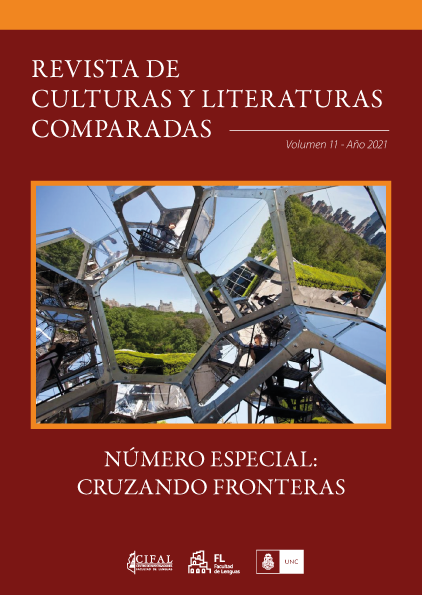La apropiación postestimonial del trauma: Stonehearst Asylum (2014) como reanimación transmedial neovictoriana de un cuento de Edgar Allan Poe
Mots-clés :
postestimonial, trauma, transposición, transmedialRésumé
El presente trabajo aborda el análisis del largometraje Stonehearst Asylum (2014), dirigido por Brad Anderson con guion de Joseph Gangemi como reanimación transmedial del cuento The system of Dr. Tarr and Professor Fether (1845) de Edgar Allan Poe. Con un marco que se apoya en la teoría de la adaptación de Hutcheon (2006), reflexiones de diversos autores sobre la cuestión de la fidelidad, reunidas por Welsh y Lev (2007), y el modelo de enfoques analíticos de Snyder (2011), el análisis se concentra en las reorientaciones que el texto fílmico, a través de las permutaciones que opera sobre el texto literario fuente, propone ante los problemas de adaptación inherentes a este último. Tales problemas se vinculan con la principal estrategia de escritura y la concomitante ironía dramática, la brevedad del cuento, cuya trama depende de escasos acontecimientos, y las múltiples capas de resonancia del hipotexto, cuyas pulsaciones provienen de su funcionamiento sincrónico como relato de humor negro, sátira sobre el abolicionismo y crítica de la democracia, entre otros subtextos. Con un marco teórico complementado por las reflexiones de Gutleben y Kohlke (2010) sobre la recreación postestimonial del sufrimiento, el trabajo se orienta a indagar sobre las transformaciones que vehiculizan la construcción del filme como un texto neovictoriano que interpela instituciones del pasado —y, espectralmente, del presente— desde una cultura de la empatía hacia el trauma psicológico, sin eludir, sin embargo, los cuestionamientos éticos que se suscitan en torno a la representación gráfica del sujeto traumatizado, es decir su po-ética.
Téléchargements
Références
Benton, Richard P. “The system of Dr. Tarr and Prof. Fether.” Poe’s Newsletter 1.1 (1968): 7-9.
Foucault, Michel. Discipline and Punishment. 1975. New York: Vintage, 1995.
Heilmann, Ann y Llewellyn, Mark. Neo-Victorianism. The Victorians in the Twenty-First century, 1999-2009. New York: Palgrave Macmillan, 2010.
Hutcheon, Linda. A Theory of Adaptation. Nueva York y Londres: Routledge, 2006.
Kohlke, Marie-Luise. “Introduction: Speculations in and on the neo-Victorian encounter”. Neo-Victorian Studies 1.1 (2008): 1-18.
Kohlke, Marie-Luise y Gutleben, Christian. “Introduction: Bearing After-Witness to the Nineteenth Century”. Neo-Victorian Tropes of Trauma. Bearing After-Witness to Nineteenth-Century Suffering. Ed. Marie-Luise Kohlke y Christian Gutleben. Amsterdam and New York: Rodopi, 2010. 1-34.
Leitch, Thomas M. “Literature vs. Literacy: Two futures for adaptation studies”. The Literature/Film Reader. Issues of Adaptation. Ed. James M. Welsh y Peter Lev. Lanham, Maryland, Toronto y Plymuth (UK): The Scarecrow Press, 2007. 15-34.
Luckhurst, Roger. The Trauma Question. London & New York: Routledge, 2008.
McFarlane, Brian. “It wasn´t like that in the book…”. The Literature/Film Reader. Issues of Adaptation. Ed. James M. Welsh y Peter Lev. Lanham, Maryland, Toronto y Plymuth (UK): The Scarecrow Press, 2007. 3-14.
Snyder, Mary H. Analyzing Literature-to-Film Adaptations. A Novelist’s Exploration and Guide. New York: Continuum, 2011.
Stam, Robert. “The Dialogics of adaptation”. Film Adaptation. Ed. James Naremore. New Brunswick, NJ: Rutgers University Press, 2000. 54-76.
Welsh, James M. y Lev, Peter. (eds.). The Literature/Film Reader. Issues of Adaptation. Lanham, Maryland, Toronto y Plymuth (UK): The Scarecrow Press, 2007.
Whipple, William. “Poe’s Two-Edged Satiric Tale.” Nineteenth-Century Fiction 9: 2 (1954): 121-133.
Téléchargements
Publiée
Numéro
Rubrique
Licence

Ce travail est disponible sous licence Creative Commons Attribution - Pas d'Utilisation Commerciale - Pas de Modification 4.0 International.
Aquellos/as autores/as que tengan publicaciones con esta revista, aceptan los términos siguientes:
a) Los/as autores/as conservarán sus derechos de autor y garantizarán a la revista el derecho de primera publicación de su obra, el cual estará simultáneamente sujeto a la Licencia de reconocimiento de Creative Commons.
b) La cesión de derechos no exclusivos implica que la publicación de los artículos en la presente revista no quita la posibilidad o el derecho al autor/a de publicar su obra de manera posterior en otras revistas u órganos editoriales y la autorización por parte de los/as autores/as para que el trabajo sea depositado en los repositorios institucionales, tales como el Portal de Revistas de la Universidad Nacional de Córdoba.



